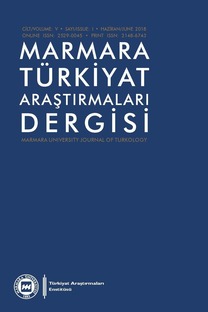Misyonerler ve Tercümanlar: Aydınlanma Çağından Devrim Çağına Fransa’da Türkçe Öğrenmek ve Öğretmek
Avrupa'da “Doğu”nun bir bilgi nesnesi haline gelmesi ve Oryantalizmin ortaya çıkmasında en önemli faktörlerin başında antikiteye ve Hristiyan Doğu'ya duyulan merakın coğrafî bir zeminde derinleşerek dönüşümü gelmektedir. Kolonyalizm çağında bu entelektüel merakın aktörleri kuşkusuz diplomatlar, tercümanlar, seyyahlar, tüccarlar ve misyonerlerdir. Doğu’nun diline, kültürüne ve tarihine olan bu merakın tatmin edilmesinin karşısındaki en önemli bariyer olan dil engelinin ortadan kaldırılması, en elzem sorundu. Bu sebeple erken modern dönemde Fransa gibi kolonyal bir devletin, Levant'ta ticarî ve siyasî bir nüfûz alanı oluşturması için, öncelikle Doğu’nun diline vâkıf diplomatların ve misyonerlerin yetiştirilmesi ihtiyacı doğmuştur. Güneş Kral XIV. Louis’den itibaren bu ihtiyacın karşılanması amacıyla pek çok adımın atıldığı, eğitim ve diplomasi alanında yeniliklerin yapıldığı görülmektedir. Böylece erken modern dönemde misyonerler ile diplomatların, ilk olarak pragmatik sebeplerle başlamış olsa da şarkiyatçılıkta zamanla kendi kurumlarını oluşturacak kadar köklü adımlar attığı görülmüştür. Bu makalede, Fransa'da erken modern dönemden itibaren Türkçe’nin öğretilmesi konusunun tarihsel arka planı ele alınmaktadır.
Anahtar Kelimeler:
Oryantalizm, Osmanlıca, Türkçe öğretimi, dragoman, Fransa
Missionaries and Drogmans: Learning and Teaching Turkish in France from the age of Enlightenment to the Age of Revolution
One of the most critical aspects of the "Orient" becoming an object of knowledge and the emergence of Orientalism in Europe has been the increasing and transforming curiosity towards the antiquity and the Christian East. The actors of this intellectual interest in the age of colonialism were diplomats, translators, travelers, traders, and missionaries. For them, removing the language barrier was a fundamental concern to meet this curiosity about the East's languages, cultures, and history. As a colonial state in the early modern period, France needed to train diplomats and missionaries versed in the Oriental languages to establish a commercial and political sphere of influence in the Levant. Many steps have been taken to meet this need since the reign of the Sun King Louis XIV and new methods were introduced in the field of education and diplomacy. The missionaries and diplomats undertook remarkable efforts to form their institutions in oriental studies, even though they started with pragmatic reasons. This article examines the historical background of teaching Turkish from the early modern period to modern times in France.
Keywords:
Orientalism, Ottoman language, teaching Turkish language, dragomans, France,
___
- Archives et manuscrits de la Bibliothèque universitaire des Langues et Civilisations
- MS TURC, 17c, Copie peut-être de la main de Denis Dominique Cardonne.
- MS TURC, 157a, Cahier de Fermans et de Tacris (1820).
- MS TURC, 179, Collection de pièces et d’actes de tout genre.
- MS TURC, 187, Pierre Ruffin.
- MS TURC, 207, Contes du Nasreddin Khodja.
- MS TURC, 241, Fables et Dialogues.
- MS TURC, 244, Vocabulaire Turc-Français de la Main de Jean-Marie.
- MS TURC, 245, Vocabulaire du Texte des Capitulations de 1153.
- MS TURC, 247, Kelâmat-ı Türkî.
- Ağıldere, Suna Timur, “Les interprètes au carrefour des cultures ou les drogmans dans l’Empire Ottoman (XVIe - debut du XXe siècle)”, Babel, LIII/3, (Mart 2007), s. 1-19.
- ____________, “XVIII. Yüzyıl Avrupası’nda Yabancı Dil Olarak Türkçe Öğretiminin Önemi: Osmanlı İmparatorluğu’nda Fransız Dil Oğlanları Okulu (1669-1873)”, Turkish Studies, V/3, (2010), s. 693-704.
- Archive du commerce, Annales Universelles diplomatiques, consulaires et commerciales, tome 37 (14e année), Paris, 1846.
- Balivet, Michel, “Avant les Jeunes de Langue: Coup d’œil sur l’apprentissage des langues Turques en monde Chrétien, de Byzance à Guillaume Postel (VIe – XVIe siècles), Istanbul et Les Langues Orientales, (ed.Frédéric Hitzel), IFEA-L’Harmattan-INALCO, Paris, (1997), s. 67-77.
- Başer, Alper,Kemal Gürülkan, “Anonim Bir Kırım Hanlığı Tarihi (1475-1778)”, Marmara Türkiyat Araştırmaları Dergisi, VIII/2, (2021), s. 402-462.
- Bazin, Louis, “Les activités turcologiques en France”, Turcica, II, (1970), s. 159-164.
- __________, “L’École des langues orientales et l’Académie des inscriptions et belles-lettres (1795-1995)”, Comptes rendus des séances de l'Académie des Inscriptions et Belles-Lettres, 139ᵉ année, 4, (1995), s. 983-996.
- Berthier, Annie, “Turquerie ou Turcologie? L’Effort de Traduction des Jeunes de Langues au XVII-e Siècle, D’Après la Collection de Manuscrits Conservée a la Bibliothèque Nationale de France”, Istanbul et Les Langues Orientales, ed. Frédéric Hitzel, IFEA-L’Harmattan-INALCO, Paris 1997, s. 283-318.
- ___________, “L’approche de l’Orient par les textes et la naissance de l’esprit scientifique: l’acquisition de manuscrits pour la Bibliothèque du roi (XVIe-XIXe s.)”, Comptes rendus des séances d l’Académie des Inscriptions et Belles-Lettres, 154e année, 4, (2010), s. 1675-1684.
- Benoist Pierre, “Le pere Joseph, l’empire Ottoman et la Méditerranée au début du XVII-e siècle”, Cahiers de la Méditerrane, 71, (2005), s. 185-202.
- Bianchi, M. Notice Historique M. Ruffin, Librairie Orientale de Dondey-Dupré Père et Fils, Paris 1825.
- Bianchi, Thomas Xavier, Vocabulaire Français-Turc, Impremeur de la Société de Géographie, Paris 1831.
- Biçer, Nurşat, “Osmanlı Döneminde Matbaada Basılan İlk Yabancılara Türkçe Kitabı Öğretimi Kitabı Üzerine”, Muallim Rıfat Eğitim Fakültesi Dergisi, I/1, (2019), s. 42-53.
- Biletzki, Anat, Talking Volwes: Thomas Hobbes on the Language of Politics and the Politics of of Language, Kluwer Academic Publishers, Londra 1997.
- Bourgey, André, “De l’École des Jeunes de Langues à l’Institut des Langues et Civilisations Orientales (INALCO)”, Istanbul et Les Langues Orientales, ed. Frédéric Hitzel, IFEA-L’Harmattan-INALCO, Paris 1997, s. 3-8.
- ISSN: 2148-6743
- Yayın Aralığı: Yılda 2 Sayı
- Başlangıç: 2014
- Yayıncı: Marmara Üniversitesi
Sayıdaki Diğer Makaleler
XX. Yüzyıl Başı Tatar Edebiyatında Süyümbike Hanbike İmgesi
Osmanlı Bürokrasisinde Şâkirdlik: 18. Yüzyılda Başmuhasebe Kalemi Örneği
Bir Seğirnâme Örneği: Avanzâde Mehmed Süleyman’ın A‘zâ Seğirmesi
Damlanur KÜÇÜKYILDIZ GÖZELCE, Songül KARACA
Töre Bitiki Metninden Hareketle Gregoryan Muhiti Kıpçak Türkçesi Terimi
Türkiye Selçuklu Sultanlarının Yeminleri
Cami Kütüphane Vakfiyelerinden Nizamnamelere Kitapları Koruma Yöntemleri
Kemal Tahir’in Modernleşme Alegorisi: Bozkırdaki Çekirdek
Misyonerler ve Tercümanlar: Aydınlanma Çağından Devrim Çağına Fransa’da Türkçe Öğrenmek ve Öğretmek
